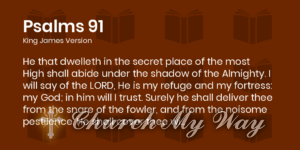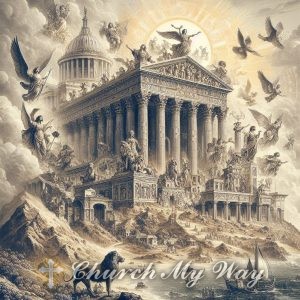The Power and Protection of Psalm 91
The Book of Psalms – Psalm 91 – contains some of the most beloved passages of Scripture. These ancient songs and prayers express the full range of human emotion while praising the might, mercy, and faithfulness of God. Of all the Psalms, Psalm 91 stands out for its bold declarations of God’s power to protect, deliver, and give refuge. This beloved passage has provided courage and comfort for Jews and Christians facing danger, persecution, illness, and uncertainty for thousands of years.
Sometimes called the “Psalm of Protection“, Psalm 91 powerfully proclaims trust in God’s watchful care over His children. The psalmist expresses complete assurance that God alone is an unassailable shelter and fortress for the soul. Key verses have been treasured by memorization, from the KJV’s “He that dwelleth in the secret place of the highest shall abide under the shadow of the Almighty” to “He shall cover thee with his feathers, and under his wings shalt thou trust”.
This article will provide an in-depth look at the history, meaning, and lasting significance of Psalm 91. We will explore key imagery, delve into scholarly insights, and discuss how Psalm 91 has comforted and encouraged generations of believers in times of distress and danger. Most importantly, we will discuss how to apply the truths and promises of Psalm 91 to our lives today, so that we too can claim the protection and peace it offers through complete trust in God.
The enduring power of Psalm 91 lies in both its poetic expression of God’s faithfulness and its concise theology of trust in God’s sovereign control over the forces of evil and danger. We invite you to join us in examining the riches of this magnificent psalm.
Overview & Meaning of Psalm 91
Psalm 91 is unique among the Psalms in its promises of God’s protection. While most psalms are prayers and songs of praise addressed directly to God, Psalm 91 consists of direct quotes from God, with no attributions to human speakers. This conveys a profound intimacy, with reassurances spoken gently and powerfully as from a loving parent. The divine speeches reveal God’s desire to quiet fearful hearts with messages of hope.
Unlike most psalms, Psalm 91 does not include laments, confessions, or statements of trust. Rather, God Himself repeatedly makes personal vows to protect and deliver those who dwell in His shelter. He reassures these beloved ones with vivid word pictures of the safety He provides against seen and unseen dangers. As such, many scholars believe Psalm 91 arose to reassure and strengthen God’s people in a time of battle or plague.
Background and Setting of Psalm 91
- God directly pledges protective care for His people, unusual among Psalms
- Likely set during a period of war or plague to reassure fearful hearts with intimacy
- God Himself calms fears with vivid shelter metaphors shielding from seen and unseen threats
Central Themes of Divine Protection
There are three intertwined themes: God calling us to abide with Him, promising deliverance from harm, and eternally embodying a strong shelter amidst stormy chaos.
“He that dwelleth in the secret place of the most High shall abide under the shadow of the Almighty” (Psalm 91:1 KJV)
Abiding Under God’s Protection
The overriding invitation is to continually dwell with the Most High, prompted by His promises to preserve rather than external circumstances. As a nurturing mother bird shelters vulnerability, God pledges layered armor against all that causes dread by night or day.
Deliverance from Seen and Unseen Dangers
Using varied metaphors from mother bird to shield to fortress wall, God vows to bear us up beyond the reach of even hidden traps or Satan’s violent schemes. No plague or peril can truly penetrate the sanctuary of His presence to touch those abiding in Him.
God as Mighty Refuge
Eloquent verses present the Lord as an unassailable stronghold in which to take courage, proclaiming with the psalmist “He is my refuge and my fortress: my God; in him will I trust.” While disorders surround us, we are called to the safest shelter.
Historical Significance and Impact of Psalm 91
| Original Context | Believed to originate during Israel’s wilderness wanderings after the Exodus (c. 15th century BCE) |
| Early Historical Role | Would have encouraged Israelites to face hunger, environmental dangers, and battles with Canaanites |
| Enduring Jewish Usage | Regular readings in the annual festival liturgy remembering the Exodus, especially Passover, and Sukkot. Sukkot ceremonies use temporary shelters related to the imagery of God’s protective “covering wings” in Psalm 91. |
| Christian Lectionary Usage | Included regularly in the cycles of scheduled Psalm readings, especially during Lent and Eastertide commemorating Christ’s sacrifice |
| Artistic Influence | The basis for countless hymns, worship songs, and anthems over history from 15th-century Luther chorales to modern works |
| Comfort Amidst Suffering | Recognized through history as encouraging those facing wars, disasters, and health crises – images of hiding in God’s shelter heard amidst turmoil |
Origins and Wilderness Context
Scholars largely believe Psalm 91 originated during Israel’s wilderness wanderings following the Exodus. Their violent plight – facing hunger, snakes, and hostile warring tribes – forms the likely original context. This psalm’s promises would have profoundly encouraged people to cry out for deliverance.
Specific divine refuge metaphors also connect to Israel’s desert trek context. The images of sheltering “under his wings” and God’s faithfulness being “thy shield and buckler” (91:4) mirror language from other Exodus accounts. For a people endangered by environmental threats and enemies, Psalm 91 would have assured God alone guarantees their protection.
An early wilderness origin aligns with evidence of this psalm’s enduring significance to Jewish history and faith for centuries thereafter. Synagogue liturgy still incorporates Psalm 91 during annual festivals remembering the Exodus like Passover. Themes of people crying out for rescue while wandering align with these early beginnings.
Usage in Jewish & Christian Tradition
Beyond its wilderness roots, Psalm 91 maintains importance in both Jewish liturgy and Christian lectionaries today. In the annual Jewish cycle of Torah readings, Psalm 91 is integral to festivals like Sukkot celebrating God’s provision during 40 years in the wilderness. People congregate in temporary booths resembling the tents referenced in verse 1.
For Christians, Psalm 91 appears regularly in the 3-year cycle of scheduled lectionary Psalm selections across denominations. It receives special prominence during Lent preparations leading to Easter’s commemoration of Christ’s sacrificial death and victory over death. Additionally, Psalm 91 remains a popular Scripture read at Christian funerals and memorial services for its eternal promises.
Segments of Psalm 91 also form the textual basis for countless hymns and modern worship songs over the centuries. A prominent early example is the 15th-century Lutheran chorale “Mitten wir im Leben sind” (Even Though We Are in the Midst of Life) by Martin Luther himself. Recent examples include Michael Joncas’ “On Eagle’s Wings” memorably performed at funerals.
Encouragement Amidst Suffering
Beyond formal liturgical usage, Psalm 91 has repeatedly been encouraged in times of crisis and persecution throughout history. Many Christians enduring hostility, violence, and plague cling to its images of hiding in God’s shelter until disaster passes by. Stories abound of disaster victims and refugees finding resilience and hope within their words.
In more modern tragedies, Psalm 91 continues offering courage during turmoil. Healthcare workers have attested to reading verses like “no plague will come near” aloud before duty in infectious outbreaks. The psalm has comforted many people affected by wars, hurricanes natural disasters over the years. Its assertions of God’s faithfulness despite danger endure across centuries and contexts.
Relevance of Psalm 91 Today
| Relevance Today | Faith in crisis, refuge in daily life, protection promises provide security |
The profound promises of Psalm 91 provide hope beyond the original ancient context. The principles of finding divine refuge and security speak powerfully even in modern unsteady times.
God’s Faithfulness in Times of Crisis
Psalm 91 remains deeply meaningful for anyone facing grief, health uncertainties, societal upheaval or other turmoil. Choosing to dwell “in the shelter of the Most High” (91:1) anchors us in God’s compassion amid changing storms. Just as God tenderly reassured past generations, His faithful wings spread over us still today.
Finding Refuge in God for Daily Life
Beyond dramatic crises, Psalm 91 models reliance on God’s care through daily stresses of work, relationships or responsibilities. Pausing to recall truths like “my God in whom I trust” (91:2) builds resilience when frustrations or loneliness creep near. God’s shelter harbors us from daily troubles.
Security Amidst Uncertainties
Drawing close to God as depicted in Psalm 91 allows us to rest in divine security when the path ahead seems filled with shadows and pitfalls. Clinging to promises that “no evil shall befall you” (91:10) grants courage for an uncertain future beyond our control. We dwell protected, at peace with all unknowns held in God’s hands.
Applying Psalm 91 to Our Lives
| Application Steps | Memorize verses, prayer prompts, study insights |
We’ve covered the origin, history, themes, and ongoing relevance of Psalm 91. Now what practical tools allow each of us to personally apply its promises of security amid storms?
“I will say of the LORD, He is my refuge and my fortress: my God; in him will I trust.” (Psalm 91:2)
Memorizing Anchor Verses
Selecting key verses from Psalm 91 to commit to memory equips us with true lifelines we can cling to in diverse seasons of hardship or doubt. When even sleep is fleeting, words like “His faithfulness will be your shield and rampart” (91:4) remain. What passages anchor your soul?
- What verses bring you comfort right now?
- How could rehearsing God’s words re-center turmoil into peace?
Prayer Based on Themes
Psalm 91 provides the pattern for crying out to God in affliction through its vivid examples of taking refuge in His presence and protection promises. Using its imagery to fuel prayer both in desperate hours and everyday concerns grounds us in God’s care.
Which verse depictions inspire your requests – wings, fortress, shadow, deliverer?
Journal a psalm blending your current struggles with Psalm 91’s truths.
Conclusion – Security Under God’s Wings
| Core Points | Psalm 91 provides security in God’s presence amidst any danger or uncertainty |
| Anchor Verses | “He alone is my refuge, my place of safety; he is my God and I trust him.” (91:2) |
Psalm 91 stands as a radiant literary gem fashioned to carry God’s reassuring promises through every generation. This beloved passage has encouraged countless souls facing despair, calamity, and anxiety about unseen enemies or the unknown future. Its poetic declarations reveal the heart of a faithful God who shields as a mother bird, protects with a warrior’s armor, and watches over His beloved even in the deepest sleep.
Dwelling near the Highest positions us to share the psalmist’s witness: “He alone is my refuge, my place of safety” (91:2). The storms will come, yet in that secret place of God’s presence no flood or foe can sweep away the child sheltered secure under His wings of love. What safe refuge Psalm 91 continues to bless as an anchor through all life’s tempests!
Most Frequently Asked Questions
| Who wrote Psalm 91? | The author is unnamed, but possibly Moses or another writer recalling the Exodus era wilderness wanderings. |
| Why is God depicted with wings/feathers? | Tender metaphors of sheltering wings reflect a mother bird’s protection. Old Testament writers employed this imagery of intimate nurturing care and strength. |
| How did Jesus reference Psalm 91? | The devil quotes Psalm 91 to tempt Jesus to jump from the Temple, but He rebukes testing God through reckless action. |
| Does “dwelling” require special holiness? | No – Psalms show humanity crying out in the full range of emotions. All are welcome to abide in intimacy with God. |
| What trials have you faced with Psalm 91? | Share your story below of storms or refuge! Let’s encourage each other. |
References:
Broyles, Craig C. “Psalm 91: On Eagles’ Wings.” Journal of Biblical Literature, vol. 108, no. 2, 1989, pp. 273–290. – Broyles provides an academic theological analysis of the psalm’s symbols and meaning.
Alter, Robert. The Book of Psalms: A Translation with Commentary. W.W. Norton & Company, 2007. – Alter delivers a seminal poetic translation and literary criticism from a leading modern Old Testament scholar.
Schaefer, Konrad. Psalms. Berit Olam: Studies in Hebrew Narrative & Poetry. Liturgical Press, 2001. – Schaefer examines form criticism and historical context questions relevant to interpreting Psalm 9













